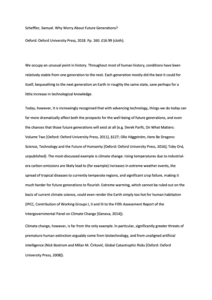Hilary Greaves: Book review of Scheffler's "Why worry about future generations?"
Other papers
Longtermist political philosophy: An agenda for future research – Jacob Barrett (Global Priorities Institute, University of Oxford) and Andreas T. Schmidt (University of Groningen)
We set out longtermist political philosophy as a research field. First, we argue that the standard case for longtermism is more robust when applied to institutions than to individual action. This motivates “institutional longtermism”: when building or shaping institutions, positively affecting the value of the long-term future is a key moral priority. Second, we briefly distinguish approaches to pursuing longtermist institutional reform along two dimensions: such approaches may be more targeted or more broad, and more urgent or more patient.
The end of economic growth? Unintended consequences of a declining population – Charles I. Jones (Stanford University)
In many models, economic growth is driven by people discovering new ideas. These models typically assume either a constant or growing population. However, in high income countries today, fertility is already below its replacement rate: women are having fewer than two children on average. It is a distinct possibility — highlighted in the recent book, Empty Planet — that global population will decline rather than stabilize in the long run. …
AI takeover and human disempowerment – Adam Bales (Global Priorities Institute, University of Oxford)
Some take seriously the possibility of AI takeover, where AI systems seize power in a way that leads to human disempowerment. Assessing the likelihood of takeover requires answering empirical questions about the future of AI technologies and the context in which AI will operate. In many cases, philosophers are poorly placed to answer these questions. However, some prior questions are more amenable to philosophical techniques. What does it mean to speak of AI empowerment and human disempowerment? …

